Yes, drone licensing requirements depend on your purpose! Recreational flyers (hobbyists) don’t need a formal license but must complete the free TRUST exam and follow FAA safety guidelines. Commercial operators, however, require FAA Part 107 certification, which involves passing a knowledge test and TSA background check. Drones under 249 grams have fewer restrictions, while heavier ones need registration regardless of use. Understanding these distinctions can save you from potential fines that reach up to $75,000!
Key Takeaways
- Commercial drone operations in the US require an FAA Part 107 certification for legal operations.
- Recreational drone flyers don’t need a formal license but must follow specific safety guidelines and complete TRUST exam.
- Drones under 249 grams are often exempt from FAA registration requirements.
- Drones over 250 grams require registration and Remote ID compliance regardless of usage purpose.
- International drone licensing requirements vary by country, requiring research before traveling with a drone.
Understanding FAA Drone Licensing Categories
The complex world of drone operation requires a clear understanding of the Federal Aviation Administration’s licensing structure before you take to the skies. The FAA has created distinct categories that separate recreational flyers from commercial operators, with each facing different requirements.
Part 107 certification serves as the gold standard for commercial drone pilots, while hobbyists can fly without formal licensing as long as they follow established guidelines. Meanwhile, operations over people fall into Categories 1, 2, or 3, each with specific safety requirements. International Licensing considerations become vital when traveling abroad, as regulations vary greatly by country!
The FAA’s Evolving Categories continue to adapt to technological advances and safety concerns—keeping up with these changes might seem challenging, but it’s essential for responsible flying. Who knew becoming a drone pilot involved so much paperwork?
Additionally, drones weighing under 249 grams often avoid FAA registration requirements, making them a popular choice for recreational flying and simplified compliance with FAA registration rules.
Part 107 Commercial Certification Requirements
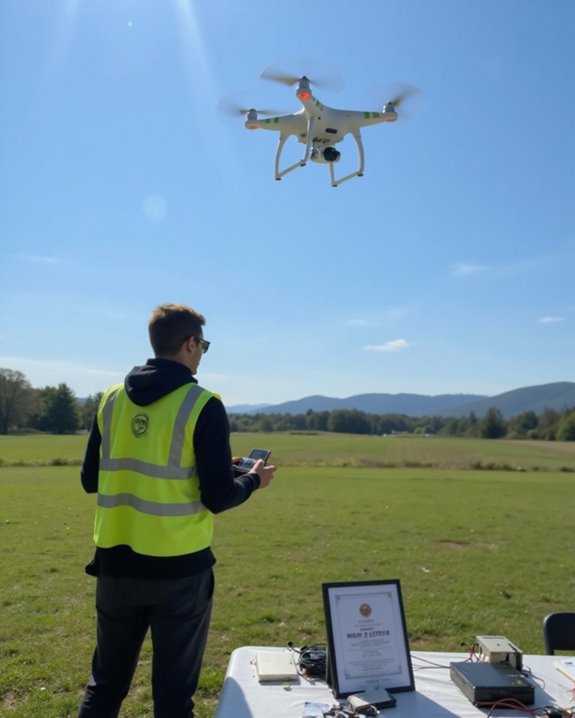
Handling the requirements for Part 107 commercial drone certification might seem challenging, but understanding the essential components will set you on a clear path to becoming a licensed operator.
The certification process requires passing the FAA’s knowledge test, which covers regulations, weather patterns, and Altitude Restrictions (maximum 400 feet AGL without a waiver). Applicants must be at least 16 years old and undergo a TSA background check. VLOS Compliance is non-negotiable—you must keep your drone within your visual line of sight at all times!
Your drone must weigh less than 55 pounds and be registered with the FAA if it’s over 0.55 pounds. Remember, the certification applies to you as the pilot, not your specific drone. The good news? Once certified, you’re legally equipped to conduct commercial operations! Additionally, many modern drones now come equipped with built-in Remote ID capabilities, helping operators stay compliant with FAA regulations.
Recreational Drone Rules and Exemptions
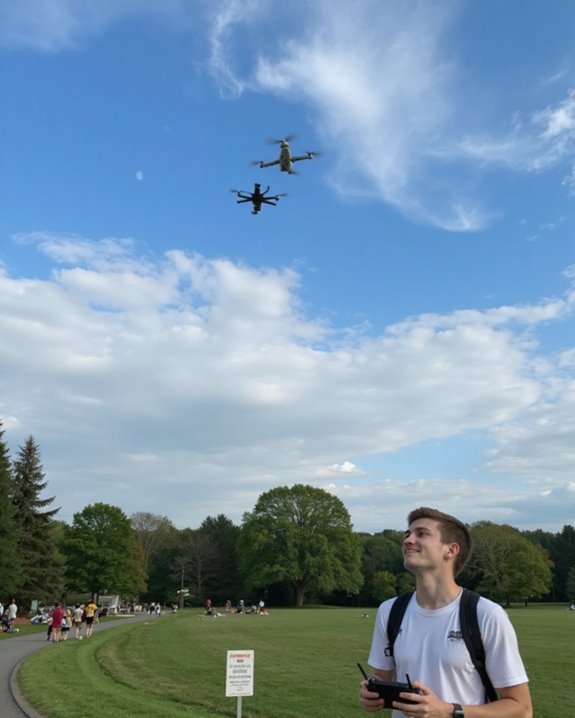
Unlike commercial operations, recreational drone flying follows a simpler set of guidelines that still prioritize safety and airspace integrity. Recreational Exemptions allow hobbyists to fly without Part 107 certification, but they must complete the TRUST exam and carry proof during flights. No formal license is required—just pass the test!
VLOS Guidelines remain non-negotiable for all recreational flyers. You must always keep your drone within eyesight without using binoculars or similar aids. Remember, flying over people, moving vehicles, or large gatherings is strictly prohibited, no matter how perfect that aerial shot might look!
For drones weighing over 250g, registration is mandatory, and most recreational drones now require Remote ID. Check the B4UFLY app before launching to avoid restricted airspace and guarantee your fun doesn’t become an FAA violation! Using an FAA compliant Remote ID module ensures legal operation and real-time tracking during your flights.
The Process of Obtaining a Remote Pilot Certificate

While recreational drone enthusiasts enjoy simplified guidelines, aspiring commercial pilots face a more structured certification pathway. The journey begins with meeting the basic age requirement of 16 years and demonstrating English language proficiency—you’ll need to read, write, and speak English with reasonable fluency!
Candidates must create an IACRA profile to obtain an FAA Tracking Number, then pass the 60-question Part 107 knowledge test with at least a 70% score. The test covers everything from airspace classification to emergency procedures. Once passed, applicants submit Form 8710-13 and wait for TSA background clearance.
The temporary certificate becomes available online after approval, with the permanent card arriving by mail. Remember, these certificates only last two years—mark your calendars for renewal!
State-Specific Drone Regulations Beyond Federal Law
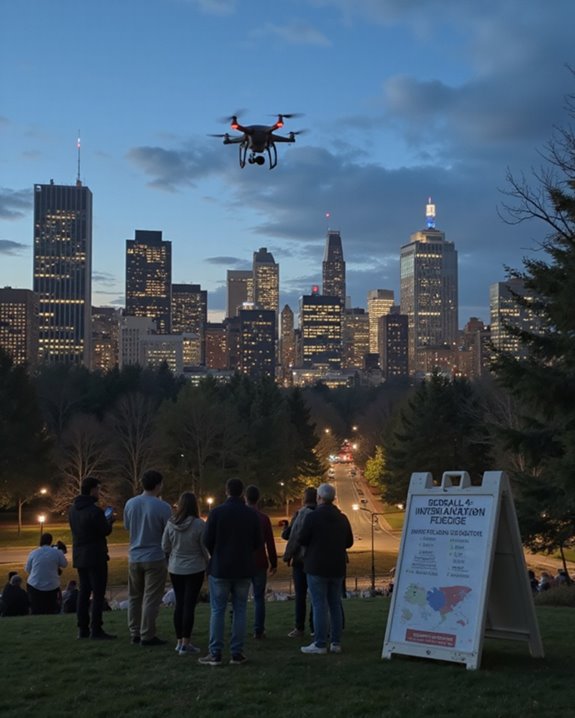
Beyond the federal regulations that govern drone operations nationwide, operators must navigate a complex patchwork of state-specific laws that can vary dramatically from one border to the next!
Some states enforce stricter altitude restrictions than the FAA’s 400-foot ceiling, while others designate unique Prohibited Areas around critical infrastructure like prisons, government buildings, or wildlife reserves. For example, you might be perfectly legal flying near a reservoir in one state, but face hefty fines for the same flight just across the state line! Many coastal states have special maritime regulations for drone flights over beaches and waterways too.
Don’t assume federal compliance is enough—local ordinances can create additional hurdles! Check your state’s aviation department website before every flight, especially when traveling, as ignorance of local drone laws won’t protect your wallet from those surprising state-specific penalties.
Career Opportunities for Licensed Drone Operators
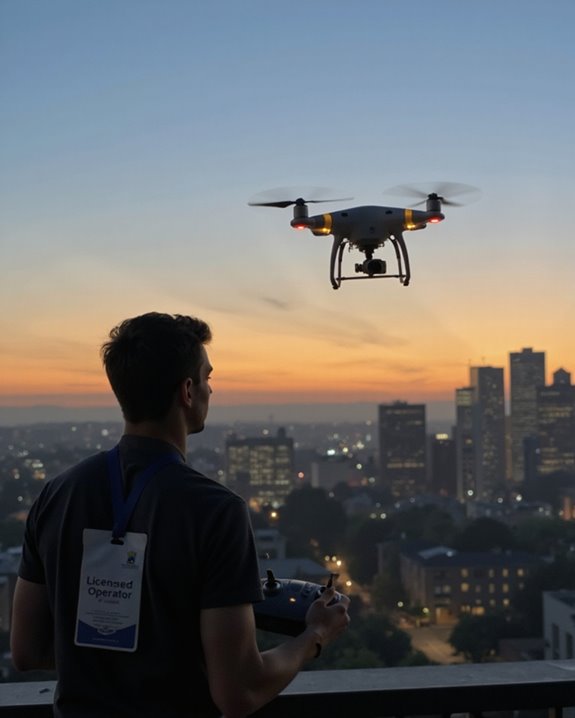
The booming drone industry offers a wealth of career opportunities for licensed operators ready to take flight! With the global market projected to reach a staggering $223.66 billion by 2034, Industry Growth is creating job roles across multiple sectors.
Licensed pilots can pursue diverse career paths in real estate, construction, agriculture, and even government agencies. Job Prospects include data capture specialists, terrain mappers, inspection technicians, and aerial photographers—with salaries in places like Fort Lauderdale ranging from $95k to $200k!
Florida alone boasts over 65 drone pilot openings, proving that certified operators are in high demand. The integration of AI-driven technology and beyond visual line of sight operations means this field isn’t just taking off—it’s soaring into uncharted territory! Professionals who maintain current certifications will find themselves perfectly positioned for this skyward career trajectory.
Penalties and Consequences for Unlicensed Operation
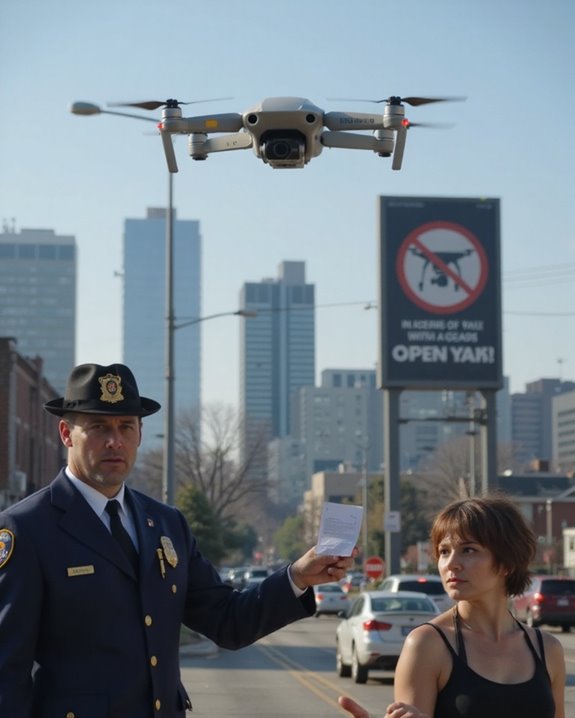
Five serious consequences await drone operators who take to the skies without proper licensing! The FAA doesn’t mess around when it comes to unauthorized flights, imposing civil fines up to a jaw-dropping $75,000 per violation. Yikes!
Criminal fines can reach $250,000 with potential imprisonment for willful violations, turning your hobby into a legal nightmare. Beyond government penalties, unlicensed operators face significant liability risks when accidents occur, including lawsuits for property damage or injuries that insurance may not cover. Your drone could be immediately confiscated if caught in restricted airspace, and repeat offenders face escalating penalties that might permanently ground their aviation ambitions. Local jurisdictions pile on with additional fines, creating a perfect storm of legal and financial consequences that make proper licensing look like a bargain!
Keeping Your Drone License Current and Compliant
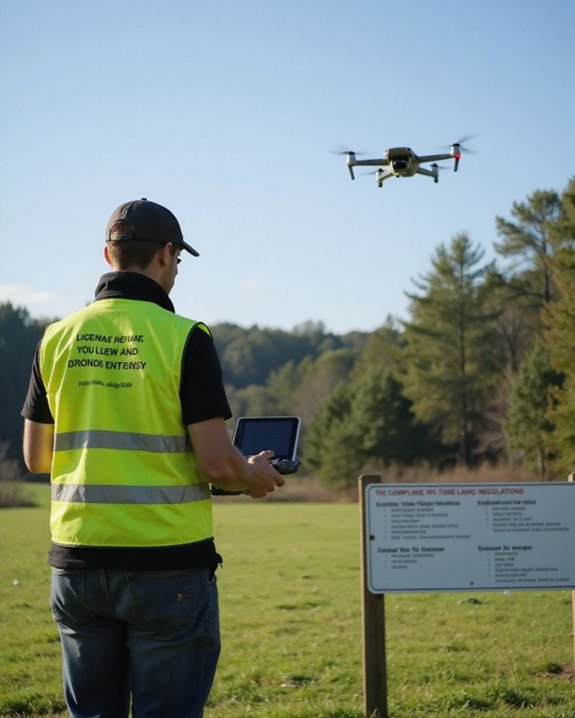
Once you’ve obtained your drone license, avoiding those hefty penalties we just covered becomes a matter of staying current—no pilot wants to risk losing their hard-earned certification! The FAA requires renewal training every 24 months through a free online course on the FAA Safety website.
After completing this training, pilots receive a completion certificate valid for another two years. No need for a new physical license; simply carry your original certificate alongside the renewal documentation and photo ID when flying. Compliance auditing may occur at any time, so maintaining proper records is essential!
Frequently Asked Questions
Can I Fly My Drone Indoors Without FAA Licensing?
Beyond the FAA’s watchful eye, indoor drone flights operate in a regulatory safe haven. No FAA licensing is required for indoor operations, though operators should still consider indoor regulations and privacy concerns when flying within enclosed spaces.
How Does Drone Licensing Differ Internationally When Traveling Abroad?
Drone licensing varies greatly internationally. Travelers must research destination country requirements, as regulations range from simple registration to strict licensing or outright bans. International differences include weight thresholds, pilot certification, and travel regulations.
Are There Age Restrictions for Obtaining a Drone License?
Age restrictions vary by operation type. Commercial drone licenses require a minimum age of 16 for Part 107 certification. Recreational flying has no specific youth limits, though all operators must complete the TRUST safety education program.
Can Military Drone Experience Count Toward Civilian Licensing Requirements?
While some might expect Experience Credit for military drone training, the reality is sobering. Despite advanced skills, Military Equivalence isn’t formally recognized. Personnel must complete the standard FAA exam for civilian certification regardless.
Do Disabled Individuals Receive Accommodations for Drone Licensing Tests?
Disabled individuals may receive accommodations for drone licensing tests through accessibility features available for FAA exams. Disability waivers or exemptions can be requested with proper medical documentation to meet regulatory requirements.





